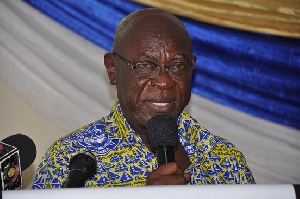The Maritime and Dockworkers’ Union(MDU) of the Trades Union Congress(Ghana) has organised its 12th Quadrennial Delegates’ Conference at Winneba from 16th to 18th June 2016 under the theme, “ The Role of the Maritime Worker in National Development”.
Delivering the Keynote address at the official opening of the conference, Dr Kofi Mbiah who deputised for the Minister for Transport stated that the maritime industry is confronted with challenges of competition and drastic technological changes.
“It would be difficult for our ports to attract very high volumes of cargo if the productivity of our ports is low”, he said.
Dr Mbiah commended the hard work of the maritime employees and encouraged them to increase productivity to make the ports efficient in order to protect jobs in the maritime industry.
He called on maritime employers to create safe working environment to enhance labour productivity and advised them to discharge their legal obligation of investing in occupational health and safety.
Dr Mbiah stated in the speech that the government regards PSC Tema Shipyard as very important for our national economy in terms of job creation, revenue generation and its role in the local content of the oil industry.
Following the decision by government that PSC Tema Shipyard should be managed by GPHA, the Minister for Transport appealed to the workers of PSC Tema Shipyard to work towards industrial peace in the company to make the company attractive to investors.
The Deputy Minister of Employment and Labour Relations, Honourable Baba Jamal in his speech congratulated the maritime workers for their role in ensuring industrial peace in the maritime industry. He added his voice to the call for the workers of PSC Tema Shipyard to work towards industrial peace in the company.
Honourable Baba Jamal stated in his speech that the Ministry of Employment and Labour Relations would work with the Maritime and Dockworkers Union and TUC on the request of MDU for the integration of the over 500 workers of the Destination Inspection Companies(DICs) who lost their jobs through the non-renewal of licences of the DICs.
“Government is not happy that these highly qualified workers would be unemployed”, he said.
Mr Daniel Owusu-Koranteng, the General Secretary of the Maritime and Dockworkers’ Union mentioned in his speech that maritime workers make extreme sacrifice in ensuring that our ports are efficient and productive.
He stated that maritime workers are very important because the sector accounts for nearly 90% of global transport requirements and this is reflected in the national economy where about 90% of Ghana’s foreign trade is carried by sea.
“It follows as a natural logic that if the national economy is so dependent on the maritime industry then the productivity of maritime workers determine to a large extent the direction of the national economy and national development”, he said.
Mr Owusu-Koranteng expressed the opinion that maritime employees work long hours away from home and families under challenging conditions with its attendant health and social consequences.
“Just as vessels sail around the globe each day in a year on time to keep global production on “just in time” basis, so do maritime workers work very hard to compress “time and space” to make our ports efficient. It is established that precarious employment in the maritime industry is the norm and workers’ pay a heavy social, financial and health costs in their efforts to contribute to national development”, he said.
He stated that redundancies, casualisation and increasing dependence on contract workers have created job insecurity among maritime employees and these factors have the tendency to weaken unions. He mentioned that in the period between 2012 and 2016, the MDU lost about two thousand (2,000) members through redundancies.
He called for strong provisions in Ghana’s labour laws to prevent employers from turning permanent jobs into casual and contract jobs.
On overtime work, Mr Daniel Owusu-Koranteng stated that labour productivity in the maritime industry depends on overtime work.
He called on government to provide tax exemption on overtime work to maritime employees. “In the past, government provided incentives including tax exemption on overtime work to maritime workers in recognition of their extreme sacrifices to national development” he said .
Touching on the weaknesses in the Labour Act, Act 651 of 2003, Mr Daniel Owusu-Koranteng expressed the view that the Labour Act had been in operation for about 13 years and it is necessary to address gaps and weaknesses in the Act for the protection of vulnerable workers.
Mr Daniel Owusu-Koranteng recounted the efforts of the MDU and the Secretary General of TUC in seeking integration of the over 500 redundant employees of the Destination Inspection Companies (DICs) in the Single Window System which replaced the work of the DICs.
The speech of Mr Daniel Owusu-Koranteng called for industrial peace in the PSC Tema Shipyard.
“Now that the government has taken a decision that GPHA should manage PSC Tema Shipyard, we need to be united in seeking the revamping of the company and the protection of our rights as workers as the way forward for Tema Shipyard”, he stated.
The 12th Quadrennial Delegates’ Conference of MDU elected a new leadership for a four-year term in the persons of Brother Abdul-Rahman Baidoo as the National Chairman ; Brother Fredrick Ebo Quansah as the National Vice Chairman; Sister Shirley Braimah as the 2nd National Vice Chairman; Brother Daniel Owusu-Koranteng as the General Secretary; Brother R.E.K Mensah as the Deputy General Secretary; Brother Gustav Nartey-Tokoli as the First National Trustee and Brother Divine Dzigbordi Kwame Tamakloe as the 2nd National Trustee.
Business News of Wednesday, 22 June 2016
Source: www.ghanaweb.com

















